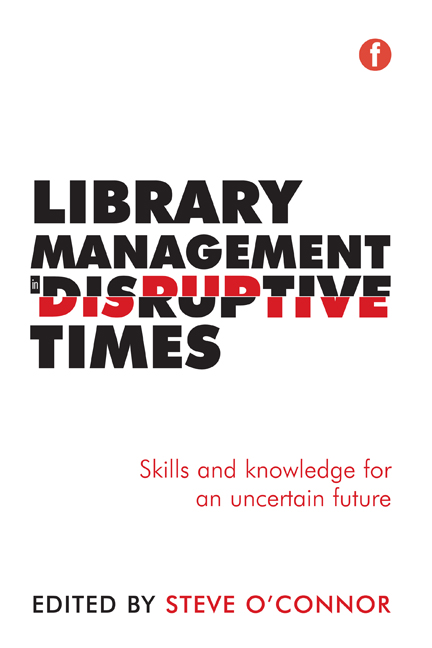Book contents
- Frontmatter
- Contents
- Contributors
- Introduction
- 1 Leading change: knowledge for success
- 2 Management fads and fashions and their impact on the LIS community
- 3 The Five Rules of Engagement for librarians: aux Ranganathan's laws of library science
- 4 Library management, disruption and consortia: an Australian example
- 5 No regrets; just lessons: economic crisis is changing our life and the management of libraries
- 6 Introducing agile principles and management to a library organization
- 7 The role of professional associations in changing times
- 8 And the walls came tumbling down ... The library profession confronts all-invasive new managerialism
- 9 What is behind the meaning of disruption? Or, thinking of management strategies from the outside
- Index
3 - The Five Rules of Engagement for librarians: aux Ranganathan's laws of library science
Published online by Cambridge University Press: 08 June 2018
- Frontmatter
- Contents
- Contributors
- Introduction
- 1 Leading change: knowledge for success
- 2 Management fads and fashions and their impact on the LIS community
- 3 The Five Rules of Engagement for librarians: aux Ranganathan's laws of library science
- 4 Library management, disruption and consortia: an Australian example
- 5 No regrets; just lessons: economic crisis is changing our life and the management of libraries
- 6 Introducing agile principles and management to a library organization
- 7 The role of professional associations in changing times
- 8 And the walls came tumbling down ... The library profession confronts all-invasive new managerialism
- 9 What is behind the meaning of disruption? Or, thinking of management strategies from the outside
- Index
Summary
Introduction
There is no doubt that librarians have crossed the threshold of a new era in the history of their profession since the advent of the internet. Global connectivity has brought information and people together instantly and seamlessly, which seems to suggest less need for mediation, co-ordination and facilitation by libraries. Yet, the information landscape has become more complex, which may create new demands that libraries and librarians can fulfil. Librarians are adapting to meet new needs, doing and planning work that was inconceivable in the past. As technology advances, librarians will move further away from old concerns. However, we should remain tethered to the core ideals of the library as an institution that promotes the use of information to deepen people's knowledge and understanding of the world. To do this, we need to be constantly reminded of the impact of our role in achieving this ideal, regardless of the future functions we perform. This paper proposes a practical way to do this.
Focusing on users
Throughout history, libraries have performed their role in a variety of ways, adapting to the needs of the people they serve and using the technology of the day. In the past, libraries focused on providing and organizing scarce information resources for use. They also took on the role of preserving the intellectual work of the past and present by building and maintaining collections. Today libraries collect, own and disseminate information resources in a less intensive way, because of changes in communication technology and publishing practices. The new, complex information environment, characterized by information abundance, ease of accessibility and disruptive interactions, has moved libraries away from collecting and towards playing a greater role in facilitating people's more effective use of information.
Users have always been an important component of the library mission, although they have occupied different degrees of prominence in different eras. Users will be the key to our profession, as collection was before circa 1990. Our impact on users depends on our interaction with them, in faceto- face or in virtual modes. Whether or not libraries will be useful and valued by users depends on the relationship between librarians and users.
- Type
- Chapter
- Information
- Library Management in Disruptive TimesSkills and knowledge for an uncertain future, pp. 37 - 50Publisher: FacetPrint publication year: 2015



